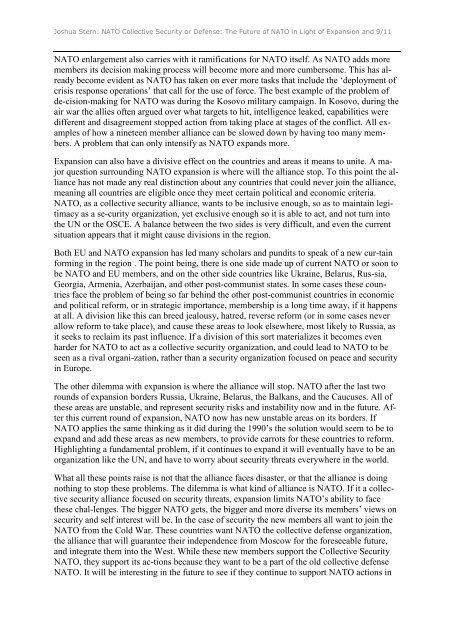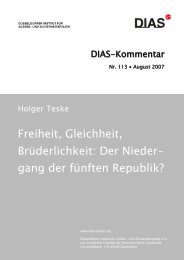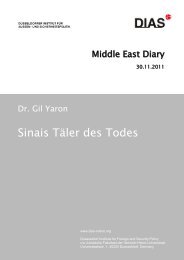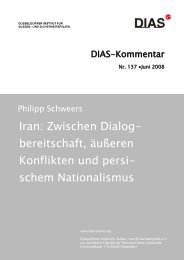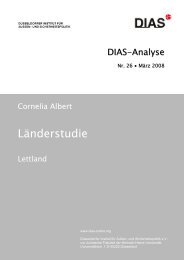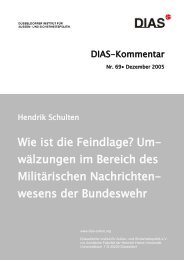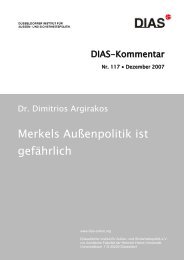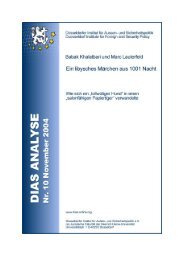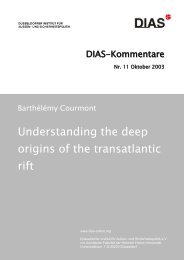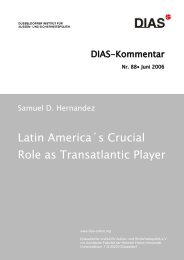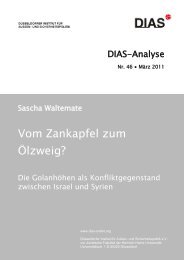NATO Collective Security or Defense - DIAS - Düsseldorfer Institut ...
NATO Collective Security or Defense - DIAS - Düsseldorfer Institut ...
NATO Collective Security or Defense - DIAS - Düsseldorfer Institut ...
Create successful ePaper yourself
Turn your PDF publications into a flip-book with our unique Google optimized e-Paper software.
Joshua Stern: <strong>NATO</strong> <strong>Collective</strong> <strong>Security</strong> <strong>or</strong> <strong>Defense</strong>: The Future of <strong>NATO</strong> in Light of Expansion and 9/11<br />
<strong>NATO</strong> enlargement also carries with it ramifications f<strong>or</strong> <strong>NATO</strong> itself. As <strong>NATO</strong> adds m<strong>or</strong>e<br />
members its decision making process will become m<strong>or</strong>e and m<strong>or</strong>e cumbersome. This has already<br />
become evident as <strong>NATO</strong> has taken on ever m<strong>or</strong>e tasks that include the „deployment of<br />
crisis response operations‟ that call f<strong>or</strong> the use of f<strong>or</strong>ce. The best example of the problem of<br />
de-cision-making f<strong>or</strong> <strong>NATO</strong> was during the Kosovo military campaign. In Kosovo, during the<br />
air war the allies often argued over what targets to hit, intelligence leaked, capabilities were<br />
different and disagreement stopped action from taking place at stages of the conflict. All examples<br />
of how a nineteen member alliance can be slowed down by having too many members.<br />
A problem that can only intensify as <strong>NATO</strong> expands m<strong>or</strong>e.<br />
Expansion can also have a divisive effect on the countries and areas it means to unite. A maj<strong>or</strong><br />
question surrounding <strong>NATO</strong> expansion is where will the alliance stop. To this point the alliance<br />
has not made any real distinction about any countries that could never join the alliance,<br />
meaning all countries are eligible once they meet certain political and economic criteria.<br />
<strong>NATO</strong>, as a collective security alliance, wants to be inclusive enough, so as to maintain legitimacy<br />
as a se-curity <strong>or</strong>ganization, yet exclusive enough so it is able to act, and not turn into<br />
the UN <strong>or</strong> the OSCE. A balance between the two sides is very difficult, and even the current<br />
situation appears that it might cause divisions in the region.<br />
Both EU and <strong>NATO</strong> expansion has led many scholars and pundits to speak of a new cur-tain<br />
f<strong>or</strong>ming in the region . The point being, there is one side made up of current <strong>NATO</strong> <strong>or</strong> soon to<br />
be <strong>NATO</strong> and EU members, and on the other side countries like Ukraine, Belarus, Rus-sia,<br />
Ge<strong>or</strong>gia, Armenia, Azerbaijan, and other post-communist states. In some cases these countries<br />
face the problem of being so far behind the other post-communist countries in economic<br />
and political ref<strong>or</strong>m, <strong>or</strong> in strategic imp<strong>or</strong>tance, membership is a long time away, if it happens<br />
at all. A division like this can breed jealousy, hatred, reverse ref<strong>or</strong>m (<strong>or</strong> in some cases never<br />
allow ref<strong>or</strong>m to take place), and cause these areas to look elsewhere, most likely to Russia, as<br />
it seeks to reclaim its past influence. If a division of this s<strong>or</strong>t materializes it becomes even<br />
harder f<strong>or</strong> <strong>NATO</strong> to act as a collective security <strong>or</strong>ganization, and could lead to <strong>NATO</strong> to be<br />
seen as a rival <strong>or</strong>gani-zation, rather than a security <strong>or</strong>ganization focused on peace and security<br />
in Europe.<br />
The other dilemma with expansion is where the alliance will stop. <strong>NATO</strong> after the last two<br />
rounds of expansion b<strong>or</strong>ders Russia, Ukraine, Belarus, the Balkans, and the Caucuses. All of<br />
these areas are unstable, and represent security risks and instability now and in the future. After<br />
this current round of expansion, <strong>NATO</strong> now has new unstable areas on its b<strong>or</strong>ders. If<br />
<strong>NATO</strong> applies the same thinking as it did during the 1990‟s the solution would seem to be to<br />
expand and add these areas as new members, to provide carrots f<strong>or</strong> these countries to ref<strong>or</strong>m.<br />
Highlighting a fundamental problem, if it continues to expand it will eventually have to be an<br />
<strong>or</strong>ganization like the UN, and have to w<strong>or</strong>ry about security threats everywhere in the w<strong>or</strong>ld.<br />
What all these points raise is not that the alliance faces disaster, <strong>or</strong> that the alliance is doing<br />
nothing to stop these problems. The dilemma is what kind of alliance is <strong>NATO</strong>. If it a collective<br />
security alliance focused on security threats, expansion limits <strong>NATO</strong>‟s ability to face<br />
these chal-lenges. The bigger <strong>NATO</strong> gets, the bigger and m<strong>or</strong>e diverse its members‟ views on<br />
security and self interest will be. In the case of security the new members all want to join the<br />
<strong>NATO</strong> from the Cold War. These countries want <strong>NATO</strong> the collective defense <strong>or</strong>ganization,<br />
the alliance that will guarantee their independence from Moscow f<strong>or</strong> the f<strong>or</strong>eseeable future,<br />
and integrate them into the West. While these new members supp<strong>or</strong>t the <strong>Collective</strong> <strong>Security</strong><br />
<strong>NATO</strong>, they supp<strong>or</strong>t its ac-tions because they want to be a part of the old collective defense<br />
<strong>NATO</strong>. It will be interesting in the future to see if they continue to supp<strong>or</strong>t <strong>NATO</strong> actions in


